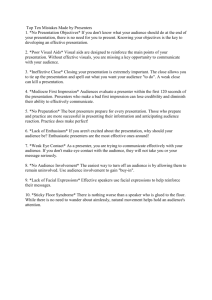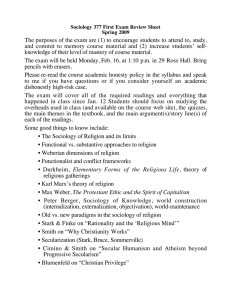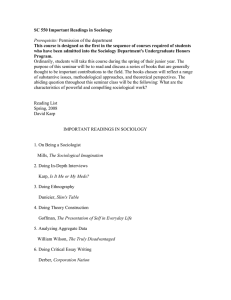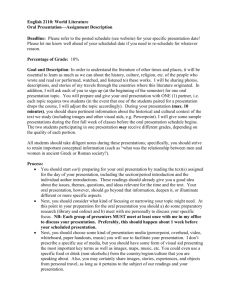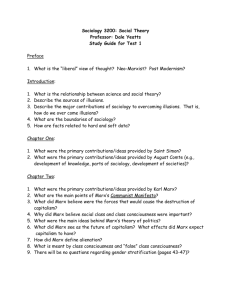Boston College SOCY 5570: Political Sociology L
advertisement
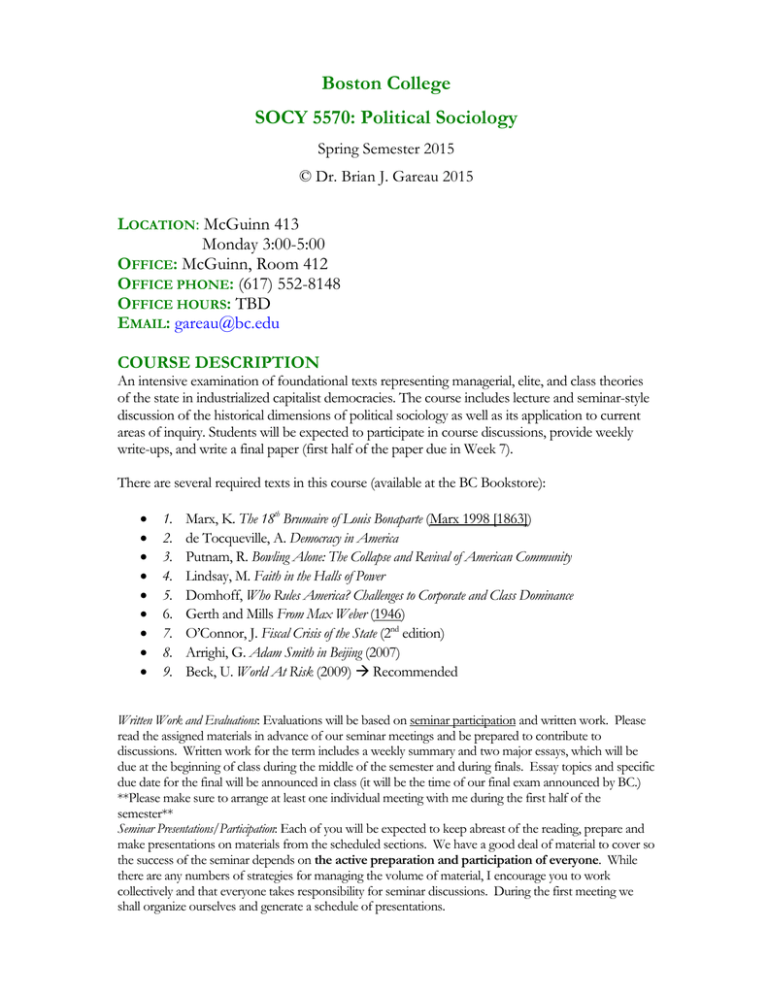
Boston College SOCY 5570: Political Sociology Spring Semester 2015 © Dr. Brian J. Gareau 2015 LOCATION: McGuinn 413 Monday 3:00-5:00 OFFICE: McGuinn, Room 412 OFFICE PHONE: (617) 552-8148 OFFICE HOURS: TBD EMAIL: gareau@bc.edu COURSE DESCRIPTION An intensive examination of foundational texts representing managerial, elite, and class theories of the state in industrialized capitalist democracies. The course includes lecture and seminar-style discussion of the historical dimensions of political sociology as well as its application to current areas of inquiry. Students will be expected to participate in course discussions, provide weekly write-ups, and write a final paper (first half of the paper due in Week 7). There are several required texts in this course (available at the BC Bookstore): 1. 2. 3. 4. 5. 6. 7. 8. 9. Marx, K. The 18th Brumaire of Louis Bonaparte (Marx 1998 [1863]) de Tocqueville, A. Democracy in America Putnam, R. Bowling Alone: The Collapse and Revival of American Community Lindsay, M. Faith in the Halls of Power Domhoff, Who Rules America? Challenges to Corporate and Class Dominance Gerth and Mills From Max Weber (1946) O’Connor, J. Fiscal Crisis of the State (2nd edition) Arrighi, G. Adam Smith in Beijing (2007) Beck, U. World At Risk (2009) Recommended Written Work and Evaluations: Evaluations will be based on seminar participation and written work. Please read the assigned materials in advance of our seminar meetings and be prepared to contribute to discussions. Written work for the term includes a weekly summary and two major essays, which will be due at the beginning of class during the middle of the semester and during finals. Essay topics and specific due date for the final will be announced in class (it will be the time of our final exam announced by BC.) **Please make sure to arrange at least one individual meeting with me during the first half of the semester** Seminar Presentations/Participation: Each of you will be expected to keep abreast of the reading, prepare and make presentations on materials from the scheduled sections. We have a good deal of material to cover so the success of the seminar depends on the active preparation and participation of everyone. While there are any numbers of strategies for managing the volume of material, I encourage you to work collectively and that everyone takes responsibility for seminar discussions. During the first meeting we shall organize ourselves and generate a schedule of presentations. COURSE DESIGN: SOCY 5570 is a seminar-format class that combines lecture with group discussion. Students’ final grade will depend, in part, on the quality of their participation in class discussion. Obviously, adequate participation requires regular attendance. You must be respectful of other’s viewpoints, experiences, orientation, etc. when discussing the concepts in this class. Debate is inevitable and useful, but be respectful. You must come prepared with a one to two-page summary write-up of the day’s readings every class. General Outline: 1. In the first paragraph, provide the general thread of argument, ideas, concepts, and/or themes that run through the readings for the week. 2. In the body of the paper, discuss in detail some of the key concepts and arguments. Discuss the readings in an integrative way; put the current readings in conversation with previous readings. Dig deep into the readings; do not provide a superficial summary. Rather, engage with the reading by giving a critical review of what you choose to focus on. 3. Then, give your view on some of these concepts. Which concepts/arguments make sense to you? Which do not? Use readings from previous weeks to support your claims. 4. Prepare some questions about the readings. What was confusing? What concepts ring true for you? Which contradict early discussions we have had? 5. This assignment will take some time to master, but it is a valuable skill, so work hard at it. Students are also required to lead the discussion with 15-20 minute formal presentations. ASSESSMENT All grades in SOCY 5570 are based on the percentages shown in Table 1. STUDENT RESPONSIBILITIES AND ASSOCIATED GRADES. Students are responsible for the work listed in Table 2. TABLE 2. STUDENT WORK & PERCENTAGE OF GRADE EARNED Midterm Essay 30% Final Essay 30% Weekly Reading Summaries 20% Class Presentations 20% TABLE 1. GRADE SCALE Letter Grade % Range A 93-100 A- 90-93 B+ 87-90 B 83-87 B- 80-83 C+ 78-80 C 73-78 C- 70-73 D+ 67-70 D 63-67 D- 60-63 F <60 o Week One (12 January, 2015) o Introductions o WEEK TWO (19 JANUARY, 2015) o MARTIN LUTHER KING JR. DAY- NO CLASSES o WEEK THREE (26 JANUARY, 2015) o Definitions of Politics and Power, and their meanings in ‘modernity’ Read: Nash, K. Contemporary Political Sociology: Globalization, Politics, Power, Chapter One (Nash 2000). Read: Kymlicka, Contemporary Political Philosophy, Chs. 2 and 5 Brian: Hand out! Presenters: __________________________________________________________ o WEEK FOUR (2 FEBRUARY, 2015) o Historical Materialism as Method, Marx, K. The 18th Brumaire of Louis Bonaparte (Marx 1998 [1863]). Presenters: __________________________________________________________ o WEEK FIVE (9 FEBRUARY, 2015) o Weber on the Types of Legitimate Domination and Authority Read: Max Weber, Part II in Gerth and Mills (Gerth and Mills 1946). o !!! GET CHAPTERS OF MOORE FROM ME !!! Presenters: __________________________________________________________ o WEEK SIX (16 FEBRUARY, 2015) o A Weberian-Marxist approach to Social Change: o Read: Moore, Barrington. The Social Origins of Dictatorship and Democracy (Moore Jr. 1969). Read Chs. 1, 3, 4, and Part 3. Presenters: __________________________________________________________ o WEEK SEVEN (23 FEBRUARY, 2015) o Marx today: Capital and State Decline Read: O’Connor, J. Fiscal Crisis of the State, Introduction (xiii-5), Chs. 1, 2, 4, 6, 7, 8, and 9 (O'Connor 2002). Presenters: __________________________________________________________ o WEEK EIGHT (2 MARCH, 2015) o SPRING VACATION- NO CLASS o WEEK NINE (9 MARCH, 2015) o Tocqueville on American Institutions and Political Mores (Tocqueville 1967) Read: Alexis de Tocqueville, Democracy in America, Volume I: Author’s introduction and chapter 3, 7-9, 11, and Conclusion. o Tocqueville on American Political Culture and Moral Sentiments Read: Alexis de Tocqueville, Democracy in America, Volume II, First Book: Author’s preface, chapters 5, 9-13; Second Book, entire; and Third Book, chapters 1-4, 8, 11-12, 17-19, Fourth Book chapter 6. *** Midterm Essay Handed Out *** Presenters: __________________________________________________________ o WEEK TEN (16 MARCH, 20150) *** Midterm Essay Due *** o WEEK ELEVEN (23 MARCH, 2015) o Bringing Tocqueville Up to the Present: US Civil Society and Social Capital Read: Robert D. Putnam, Bowling Alone: America’s Declining Social Capital (Putnam 2000). o Marxist Critique: Is Social Capital ‘Social’ and Is It Even Really ‘Capital?’ Read: Ben Fine (2002). o Get from Me! Presenters: __________________________________________________________ o WEEK TWELVE (30 MARCH, 2015) o The Culture Wars: Contemporary Conservatism in America Read: Lindsay, M. Faith in the Halls of Power (Lindsay 2007). Presenters: __________________________________________________________ o WEEK THIRTEEN (6 APRIL, 2015) o EASTER MONDAY- NO CLASSES o WEEK FOURTEEN (13 APRIL, 2015) o The Ruling Elite in American Democracy and Recent Voting Patterns in American Politics o Read: G. William Domhoff, Who Rules America: Power, Politics, & Social Change (Domhoff 2006). Presenters: __________________________________________________________ o WEEK FIFTEEN (20 APRIL, 2015) o PATRIOTS DAY- NO CLASSES o WEEK SIXTEEN (27 APRIL, 2015) o Global Political Sociology: China and Shifting Hegemony in Globalization o Read: Arrighi, G. Adam Smith in Beijing: Lineages of the 21st Century, Part I, III, and IV (Arrighi 2007). Presenters: __________________________________________________________ 1-4 MAY, 2015 STUDY DAYS *** FINAL ESSAY DUE ON DAY LISTED ON BC EXAM SCHEDULE *** References Arrighi, Giovanni. 2007. Adam Smith in Beijing: Lineages of the 21st Century. New York: Verso. Beck, Ulrich. 2009. World at risk. English ed. Cambridge, UK ; Malden, MA: Polity. Domhoff, G. William. 2006. Who Rules America? Power, Politics, & Social Change. 5th ed. New York: McGraw Hill. Fine, Ben. 2002. They F*ck You Up Those Social Capitalists. Antipode:796-799. Foucault, Michel. 1980. Power/Knowledge: Selected Interviews and Other Writings, 19721977. Edited by C. Gordon. 1st American ed. New York: Pantheon Books. Foucault, Michel. 1995. Discipline and Punish: The Birth of the Prison. 2nd Vintage Books ed. New York: Vintage Books. Gerth, H.H., and C. Wright Mills, eds. 1946. From Max Weber: Essays in Sociology. New York: Oxford University Press. Lindsay, D. Michael. 2007. Fatih in the Halls of Power. Cambridge: Cambridge University Press. Marx, Karl. 1998 [1863]. The 18th Brumaire of Louis Bonaparte. Vol. International Publishers: New York. Moore Jr., Barrington. 1969. Social Origins of Dictatorship and Democracy. Boston: Beacon Press. Nash, Kate. 2000. Contemporary political sociology : globalization, politics, and power. Malden, Mass.: Blackwell Publishers. O'Connor, James. 2002. The Fiscal Crisis of the State. Second ed. New Jersey: Transaction Publishers. Putnam, Robert D. 2000. Bowling alone : the collapse and revival of American community. New York: Simon & Schuster. Skocpol, T. 1992. Protecting Soldiers and Mothers: the political origins of social policy in the United States. Cambridge: Harvard University Press. Tocqueville, Alexis de. 1967. Democracy in America. New York: Vintage Books.

